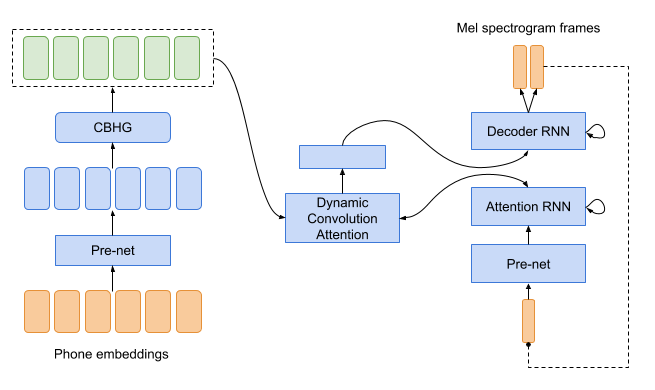A PyTorch implementation of Location-Relative Attention Mechanisms For Robust Long-Form Speech Synthesis.
Project description
Tacotron (with Dynamic Convolution Attention)
A PyTorch implementation of Location-Relative Attention Mechanisms For Robust Long-Form Speech Synthesis. Audio samples can be found here.

Fig 1:Tacotron (with Dynamic Convolution Attention).

Fig 2:Example Mel-spectrogram and attention plot.
Quick Start
Ensure you have Python 3.6 and PyTorch 1.7 or greater installed. Then install this package with:
pip install tacotron
Example Usage
import torch
import soundfile as sf
from univoc import Vocoder
from tacotron import load_cmudict, text_to_id, Tacotron
# download pretrained weights for the vocoder (and optionally move to GPU)
vocoder = Vocoder.from_pretrained(
"https://github.com/bshall/UniversalVocoding/releases/download/v0.2/univoc-ljspeech-7mtpaq.pt"
).cuda()
# download pretrained weights for tacotron (and optionally move to GPU)
tacotron = Tacotron.from_pretrained(
"https://github.com/bshall/Tacotron/releases/download/v0.1/tacotron-ljspeech-yspjx3.pt"
).cuda()
# load cmudict and add pronunciation of PyTorch
cmudict = load_cmudict()
cmudict["PYTORCH"] = "P AY1 T AO2 R CH"
text = "A PyTorch implementation of Location-Relative Attention Mechanisms For Robust Long-Form Speech Synthesis."
# convert text to phone ids
text = torch.LongTensor(text_to_id(text, cmudict)).unsqueeze(0).cuda()
# synthesize audio
with torch.no_grad():
mel, _ = tacotron.generate(text)
wav, sr = vocoder.generate(mel.transpose(1, 2))
# save output
sf.write("location_relative_attention.wav", wav, sr)
Train from Scatch
- Clone the repo:
git clone https://github.com/bshall/Tacotron
cd ./Tacotron
- Install requirements:
pip install -r requirements.txt
- Download and extract the LJ-Speech dataset:
wget https://data.keithito.com/data/speech/LJSpeech-1.1.tar.bz2
tar -xvjf LJSpeech-1.1.tar.bz2
- Download the train split here and extract it in the root directory of the repo.
- Extract Mel spectrograms and preprocess audio:
python preprocess.py in_dir=path/to/LJSpeech-1.1 out_dir=datasets/LJSpeech-1.1
- Train the model:
python train.py checkpoint_dir=ljspeech dataset_dir=datasets/LJSpeech-1.1 text_dir=path/to/LJSpeech-1.1/metadata.csv
Pretrained Models
Pretrained weights for the LJSpeech model are available here.
Notable Differences from the Paper
- Trained using a batch size of 64 on a single GPU (using automatic mixed precision).
- Used a gradient clipping threshold of 0.05 as it seems to stabilize the alignment with the smaller batch size.
- Used a different learning rate schedule (again to deal with smaller batch size).
- Used 80-bin (instead of 128 bin) log-Mel spectrograms.
Acknowlegements
Project details
Release history Release notifications | RSS feed
Download files
Download the file for your platform. If you're not sure which to choose, learn more about installing packages.
Source Distribution
tacotron-0.1.0.tar.gz
(907.6 kB
view hashes)
Built Distribution
tacotron-0.1.0-py3-none-any.whl
(910.1 kB
view hashes)











